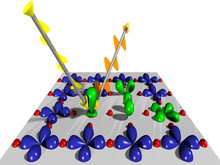
Back حالة مثارة Arabic Estáu escitáu AST Възбудено състояние на атома Bulgarian উত্তেজিত দশা Bengali/Bangla Estat excitat Catalan Excitovaný stav Czech Пăлхану (физика) CV Exciteret tilstand Danish Angeregter Zustand German Διεγερμένη κατάσταση Greek


In quantum mechanics, an excited state of a system (such as an atom, molecule or nucleus) is any quantum state of the system that has a higher energy than the ground state (that is, more energy than the absolute minimum). Excitation refers to an increase in energy level above a chosen starting point, usually the ground state, but sometimes an already excited state. The temperature of a group of particles is indicative of the level of excitation (with the notable exception of systems that exhibit negative temperature).[citation needed]
The lifetime of a system in an excited state is usually short: spontaneous or induced emission of a quantum of energy (such as a photon or a phonon) usually occurs shortly after the system is promoted to the excited state, returning the system to a state with lower energy (a less excited state or the ground state). This return to a lower energy level is known as de-excitation[1] and is the inverse of excitation.
Long-lived excited states are often called metastable. Long-lived nuclear isomers and singlet oxygen are two examples of this.[citation needed]
- ^ Sakho, Ibrahima. Nuclear Physics 1: Nuclear Deexcitations, Spontaneous Nuclear Reactions. John Wiley & Sons, 2021.